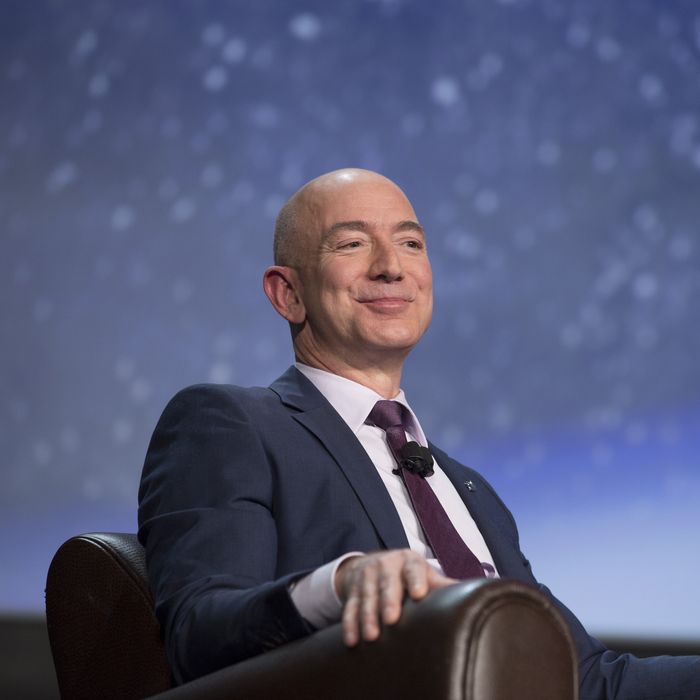
A billionaire many times over, Jeff Bezos could do anything on Earth. Instead, he is leaving it, briefly, on a rocket that will nudge the edge of space before it returns. Bezos did not found his rocket company, Blue Origin, only for this purpose, but there is an undeniable element of wish fulfillment in the endeavor. Going to space is a lifelong dream, he’s said, though he’s also quick to claim more altruistic motivations. “I’ve been studying it and thinking about it since I was a 5-year-old boy, but that is not why I’m pursuing this work,” he once claimed in an interview. “I’m pursuing this work because I believe if we don’t, we will eventually end up with a civilization of stasis, which I find very demoralizing.”
But how much does he really care about civilization? From the vantage of space, or from atop a pile of dollars, people must look like ants. The world is one teeming hill, populated with anonymous workers doing menial labor. A human being concerns himself little with the affairs of ants. They work, and then they die. Bezos might claim a more expansive vision for himself, might say that the goal of Blue Origin is not to enrich himself but to turn the ants into a spacefaring species. It almost sounds like charity, but Bezos would prefer we all keep moving into space and his warehouses, anything but closer to his fortune.
Bezos paid no federal income taxes in 2007, or 2011, ProPublica recently reported. From 2006 to 2018, his wealth “increased by $127 billion, according to Forbes, but he reported a total of $6.5 billion in income,” resulting in a “a 1.1% true tax rate on the rise in his fortune.” In isolation, the millions in taxes Bezos paid in this time period looks significant; in reality, it’s far less than what he rightly owed. He isn’t the only billionaire to take advantage of the tax system that treats labor worse than capital. Nor is he the only tycoon whose workers report chaotic, even dangerous conditions from within the company he built. But Bezos is the world’s richest man, and the gap between his life and the lives he’s created for his workers is thus especially stark.
This is true both in the case of Amazon particularly, as its workforce copes with physically and psychologically demanding schedules in the name of delivery speed. In a broader sense, Bezos has cheated everyone, and not just his own workers. What has his personal prosperity accomplished for anyone else? A defender might point to job creation or to the convenience that Amazon offers. The costs, however, are high, both for workers and for the general public. Amazon has become so mammoth that its reach is difficult to escape. It harms small business owners, who can find their markets swallowed up by Amazon; it harms consumers, who suffer from a lack of fair competition; and it harms workers, who face a mighty foe in their quest for more tolerable conditions on the job.
As Amazon moves ever closer to a new status as America’s largest private employer, according to the New York Times, regard the country Bezos helped shape. The toiletries you order can be on your doorstep the next day, but wealth inequality is growing, and billionaires like Bezos have no interest in reversing the trend. Though Bezos is stepping down as the CEO of Amazon, he built the company in his image. It won’t tolerate a union; its idea of building a fair workplace is to give workers “ZenBooths” so they can practice meditation. If Bezos really is in a position to usher mankind to the stars, the civilizational vision he possesses isn’t one we should want for ourselves. It’s too lopsided and unfair; it’s cramped inside that anthill. His dreams for himself are expansive. For everyone else, they’re just too small.
The Bezos billions are significant enough to power him off world and bring him back, gently, in relative luxury. But we’re the ones who are really paying for his trip. Tuesday’s flight isn’t just a scientific marvel. It’s a grotesque spectacle. The wealthiest soar while the rest of us are tied to Earth.






























